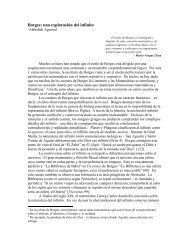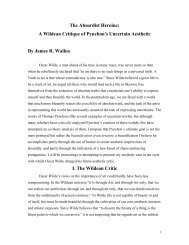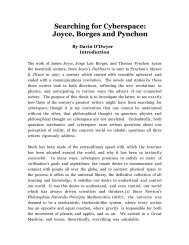And A Very Good Time It Was: A Short Life of ... - The Modern Word
And A Very Good Time It Was: A Short Life of ... - The Modern Word
And A Very Good Time It Was: A Short Life of ... - The Modern Word
You also want an ePaper? Increase the reach of your titles
YUMPU automatically turns print PDFs into web optimized ePapers that Google loves.
tried the heroic route, telling Grant that “[I]f a change is to take place [in these laws] I do not see<br />
why it should not be now.” 88 Instead the objections were only added to, now in the use <strong>of</strong> the<br />
word “bloody,” (e.g., “...she brought me two bloody fine cigars...”) to which Joyce said, “Is it not<br />
ridiculous that my book cannot be published because it contains this one word which is neither<br />
indecent or blasphemous?” 89 In what was probably an ironic remark, Joyce asked Richards why,<br />
amid all these specific words, he didn’t object to the entirety <strong>of</strong> “<strong>The</strong> Encounter”—so Richards<br />
did, saying the entire story had to be removed, as did “Two Gallants.”<br />
Joyce gave in with obvious reluctance to remove a few “bloodies,” but would not remove an<br />
entire story. He wrote to Richards,<br />
<strong>It</strong> is not my fault that the odour <strong>of</strong> ashpits and old weeds and <strong>of</strong>fal hangs around<br />
my stories. I seriously believe that you will retard the course <strong>of</strong> civilisation in<br />
Ireland by preventing the Irish people from having one good look at themselves<br />
in my nicely polished looking-glass. 90<br />
Frustrated with Richards and stalled in Stephen Hero, Joyce needed to move again. He found<br />
a position in a bank in Rome and, leaving Stanislaus in Trieste, moved there in July, 1906. <strong>It</strong> is an<br />
understatement to say he disliked the city. “Rome reminds me <strong>of</strong> a man who lives by exhibiting to<br />
travellers his grandmother’s corpse,” 91 is one <strong>of</strong> his many remarks on the city. <strong>It</strong> didn’t help that<br />
he found his job as bank-clerk so nauseating: he worked from 8:30 in the morning to 7:30 at<br />
night, with two hours in between for lunch, perpetually wearing a long tailcoat to cover the large<br />
patches on the backs <strong>of</strong> his pants. 92 At the same time, however, in reading Joyce’s correspondence<br />
one realizes that most <strong>of</strong> his letters to Stanislaus were written while he was at work: indeed he<br />
always left out the fact that his superiors allowed him more special privileges than other<br />
employees. 93<br />
Worse <strong>of</strong> all, the bank paid him once a month, so no sooner did he have money than it was<br />
spent, followed by letters to Stanislaus for help. But the constant presence <strong>of</strong> the dead and <strong>of</strong><br />
history in Rome only made he and Nora more nostalgic for their own past in Ireland. A few story<br />
ideas came to Joyce as a result: one, to be called “Ulysses,” and about “the putatively Jewish<br />
Dubliners,” was given another seven years to gestate. A story that he did begin in Rome was “<strong>The</strong><br />
Dead.” “Out <strong>of</strong> their hunger and homesickness came the richly laden Christmas table <strong>of</strong> ‘<strong>The</strong><br />
Dead’,” 94 Brenda Maddox says, and this nostalgia spread to all <strong>of</strong> Ireland, as when Joyce wrote <strong>of</strong><br />
the story,<br />
Sometimes thinking <strong>of</strong> Ireland it seems to me that I have been unnecessarily<br />
harsh. I have reproduced (in Dubliners at least) none <strong>of</strong> the attraction <strong>of</strong> the city<br />
... I have not reproduced its ingenuous insularity and its hospitality.” 95<br />
He hoped to show this hospitality in “<strong>The</strong> Dead,” but this was not enough. <strong>The</strong> ending, where<br />
Gabriel Conroy hopes to rejuvenate his marriage with his wife only to find out she has a previous<br />
love on her mind, came from combining Nora’s memories <strong>of</strong> Michael Bodkin and Michael Furey,<br />
both <strong>of</strong> whom died young <strong>of</strong> disease. For a man as jealous as Joyce this was a battle he could<br />
never win—for how to defeat the influence <strong>of</strong> those already dead?<br />
Meanwhile, Grant Richards now informed Joyce that he refused to publish Dubliners at all,<br />
Nora became pregnant again, and Joyce was more than sick <strong>of</strong> Rome. Stanislaus, who had gotten<br />
used to living without him, begged his brother to stay there, but Joyce returned to Trieste. <strong>The</strong><br />
Berlitz School there at first refused to hire him back, but when it became apparent that enough<br />
students would take private lessons with him, they hired him rather than compete with him.<br />
<strong>The</strong> acceptance <strong>of</strong> Chamber Music by Elkin Matthews in January, 1907, gave Joyce little<br />
solace. “A page <strong>of</strong> A Little Cloud gives me more pleasure than all my verses,” 96 he said, but was<br />
probably being too harsh. <strong>The</strong> poems are definitely those <strong>of</strong> a young man, and far from the genius<br />
<strong>of</strong> his other work, but at the very least Chamber Music remained a personal book for Joyce and





